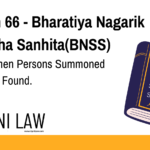Section 70: Proof Of Service In Such Cases And When Serving Officer Not Present
Code: Section 70 BNSS
(1) When a summons issued by a Court is served outside its local jurisdiction, and
in any case where the officer who has served a summons is not present at the hearing of the
case, an affidavit, purporting to be made before a Magistrate, that such summons has been
served, and a duplicate of the summons purporting to be endorsed (in the manner provided
by section 64 or section 66) by the person to whom it was delivered or tendered or with
whom it was left, shall be admissible in evidence, and the statements made therein shall be
deemed to be correct unless and until the contrary is proved.
(2) The affidavit mentioned in this section may be attached to the duplicate of the
summons and returned to the Court.
(3) All summons served through electronic communication under sections 64 to 71
(both inclusive) shall be considered as duly served and a copy of such summons shall be
attested and kept as a proof of service of summons.
Explanation of Section 70 BNSS
Key Aspects of Proof of Summons Service
-
Affidavit as Proof of Service
-
If a summons is served outside the Court’s local jurisdiction, an affidavit by the serving officer (attested before a Magistrate) acts as valid legal proof.
-
This is necessary when the serving officer is not available at the hearing.
-
Endorsed Duplicate Summons
-
A duplicate copy signed by the person receiving the summons is treated as evidence.
-
Unless proven otherwise, it is presumed correct.
-
Electronic Summons Considered Valid
-
Electronic service of summons (as per Sections 64–71 BNSS) is considered legally valid.
-
A copy of the summons must be attested and stored as proof.
Illustration of Section 70 BNSS
Example 1: Summons Served Outside Local Jurisdiction
A Delhi Court issues a summons to a witness in Mumbai.
-
The Mumbai police officer serves the summons but is unable to attend the Delhi Court.
-
He submits an affidavit before a Magistrate in Mumbai confirming service.
-
The Delhi Court accepts the affidavit as proof of service.
Example 2: Summons Served Electronically
The Court sends a summons via email and WhatsApp.
-
The recipient reads and acknowledges the message.
-
A digital copy of the summons and the delivery receipt are stored.
-
The Court deems the summons as duly served.
Common Questions and Answers on Section 70 BNSS
1. How can proof of service be established if the officer is absent?
✅ An affidavit before a Magistrate acts as legal proof.
2. Can electronic summons be legally valid?
✅ Yes, under Section 70(3), all electronic summons are considered duly served.
3. What happens if a person denies receiving the summons?
✅ If the officer’s affidavit or the electronic delivery proof exists, the Court assumes the summons was served unless proven otherwise.
4. What role does an endorsed duplicate summons play?
✅ A signed duplicate copy of the summons is admissible evidence in Court.
5. How does this provision improve the legal system?
🚀 It reduces delays, allows digital proof of service, and ensures reliable delivery of summons.
Conclusion
Section 70 BNSS strengthens proof of summons service by allowing:
✅ Affidavits as legal evidence,
✅ Endorsed duplicate summons as proof, and
✅ Electronic service of summons.
These provisions ensure faster legal proceedings and prevent delays in witness appearances.
For expert legal guidance, visit ApniLaw today!










